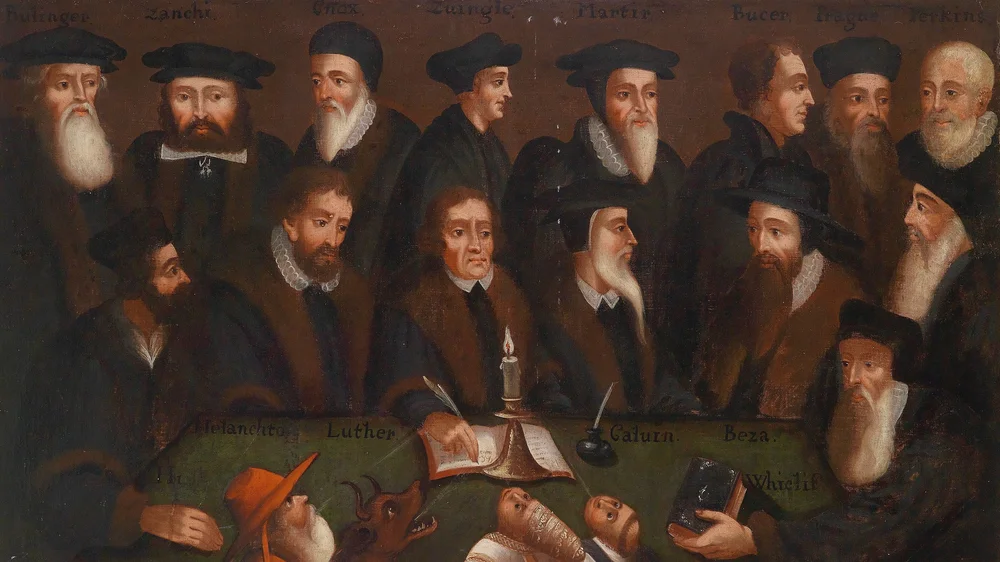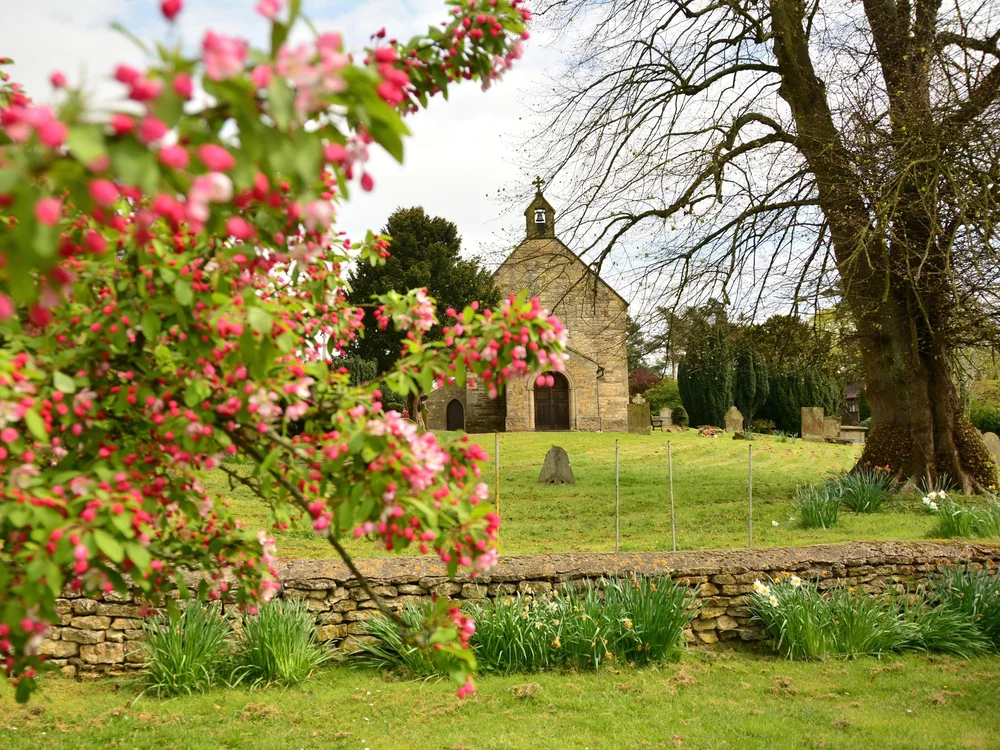
Image by Shutterstock.com
Disclosure: This post may contain affiliate links, meaning Beautiful Christian Life LLC may get a commission if you decide to make a purchase through its links, at no cost to you.
Survey history and you will soon see that the health of the church rises and falls with its convictions about the Bible. When the church knows and believes that the Bible is God’s Word, it grows as strong as Hercules. It becomes a light on the hill, a sheltering tree with wide-spreading branches.
When the church is confused about the Bible, its light grows dim, its branches wither. It becomes more of a danger than a help.
In Revelation 8-9 the first six trumpets sounded. The seventh trumpet will not sound until chapter 11. In Revelation 10 we stop and reflect on something vital: the character of God’s spoken and written revelation.
Revelation 10 reveals to us six facts about God’s word that when known and believed will strengthen and enliven the church:
1. Jesus Christ is the author of God’s Word.
Revelation 10:1-3 Then I saw another mighty angel coming down from heaven, wrapped in a cloud, with a rainbow over his head, and his face was like the sun, and his legs like pillars of fire. He had a little scroll open in his hand. And he set his right foot on the sea, and his left foot on the land, and called out with a loud voice, like a lion roaring. When he called out, the seven thunders sounded.
Basically, angelos means “messenger.” Many debate whether or not this particular messenger is Jesus. I argue that he is, but even if you don’t agree we must all see that he manifests undeniably Christ-like attributes.
First, he is wrapped and robed in a cloud, just like the LORD in the Old Testament. Jesus said that he would return like that for final judgment, in fulfillment of Daniel 7:13:
“But I tell you, from now on you will see the Son of Man seated at the right hand of Power and coming on the clouds of heaven.” (Matt. 26:64)
Second, his head is crowned with a rainbow, the sign of the Noahic Covenant of mercy when the LORD pledged never again to destroy the world by flood (Gen. 9:14-16). Revelation has already shown us Jesus—the Lamb who was Slain—on the throne and encircled by the rainbow (4:3).
Third, his face shines like the sun. Revelation 1:16 showed Jesus like this, and on the Mount of Transfiguration Peter, James, and John saw the same: “And he was transfigured before them, and his face shone like the sun, and his clothes became white as light” (Matt. 17:2).
Fourth, his feet (podes can refer either to feet or legs) are like fire. Revelation 1:15 showed Jesus with feet “like burnished bronze, refined in a furnace.” His feet are the solid opposite of the feet of clay of Nebuchadnezzar’s statue, which represented ephemeral world empires (Dan. 2:33).
Fifth, he holds a biblaridion, a little scroll or book. (“Bible” comes from biblion, which was in turn derived from the Phoenician city Byblos, well known as the port through which Egyptian papyrus was imported into Palestine.) For now, we note that in Revelation a scroll usually represents God’s decree for history. We will return to this little scroll in a moment.
Sixth, he plants his right foot on the oceans, and his left foot on the land. This is the Creator of heaven and earth, who stands over and transcends his creation. It recalls Jesus striding over the raging waters of the Sea of Galilee like he owned it. Indeed, he created and owns and rules the universe.
Seventh, he gave “a loud voice, like a lion roaring.” This is the invincible voice of the Lion of Judah, Jesus Christ, who spoke creation into being (Rev. 5:5).
The author of the little scroll, and all of God’s revelation, whether spoken through his prophets of the Old Testament, or his apostles of the New, is Jesus Christ.
“All Scripture is theopneustos”, said Paul (2 Tim. 3:16); theopneustos means “breathed out by God.” Every word and syllable and letter of the Bible comes out of the mouth of Jesus Christ.
2. God’s Word is Jesus’ powerful voice.
Revelation 10:3-4 [He] called out with a loud voice, like a lion roaring. When he called out, the seven thunders sounded. And when the seven thunders had sounded, I was about to write...
Here we expand on verses 3-4. Last year the mighty cruise ship MS Queen Elizabeth, 300 metres long and weighing 92,000 tons, docked in Hobart. I happened to be on the wharf at its departure, when it gave a triple blast on its horn. It was like the deep bass rumble of a very large cathedral pipe organ, but quantumly louder, easily the loudest man-made sound I’ve heard, and felt. The blast bounced off Mount Wellington and echoed and resounded around the city for a remarkably long time.
Jesus’ Word is echoed by “seven thunders.”
Again and again the Gospels let us hear the mighty power of Jesus’ voice:
-
Jesus spoke sternly to a demon-possessed man: “‘Be quiet! Come out of him!’ The evil spirit shook the man violently and came out of him with a shriek” (Mark 1:25-26).
-
Jesus “rebuked the wind and said to the waves, ‘Quiet! Be still!’ Then the wind died down and it was completely calm” (Mark 4:39).
-
Jesus spoke to Lazarus’s corpse, four days dead and decomposing: “‘Lazarus, come out!’ The dead man came out, his hands and feet wrapped with strips of linen, and a cloth around his face” (John 11:43-44).
-
When soldiers came to arrest him in the Garden of Gethsemane, “They were carrying torches, lanterns and weapons. Jesus… asked them, ‘Who is it you want?’ ‘Jesus of Nazareth,’ they replied. ‘I am he.’ … When Jesus said, ‘I am he,’ they drew back and fell to the ground” (John 18:3-6). His word brought them to their knees.
Scripture bears all the power of Christ its author. So when it is read and taught in our churches and the Spirit is at work, something extraordinary happens:
But if all prophesy, and an unbeliever or outsider enters, he is convicted by all, he is called to account by all,the secrets of his heart are disclosed, and so, falling on his face, he will worship God and declare that God is really among you. (1 Cor. 14:24-25)
God’s Word is the saving word of Jesus, which breaks hard hearts, opens blind eyes, and brings about the new birth, repentance, and faith in him.
For God, who said, “Let light shine out of darkness,” has shone in our hearts to give the light of the knowledge of the glory of God in the face of Jesus Christ. (2 Cor. 4:6)
3. God’s Word doesn’t tell us everything.
Revelation 10:4 And when the seven thunders had sounded, I was about to write, but I heard a voice from heaven saying, “Seal up what the seven thunders have said, and do not write it down.”
Jesus’ seven letters to the church were dictated, written down, and read out loud in the churches (Rev. 2-3). The effects of the broken seven seals were likewise written down (5-8.) And the effects of the seven trumpet blasts were written down (8-11.)
The seven thunders were not to be written down.
This is a disturbing reminder that God’s Word does not tell us everything. It certainly tells us enough, as the Westminster Confession of Faith reminds us:
The whole counsel of God, concerning all things necessary for his own glory, man’s salvation, faith, and life, is either expressly set down in Scripture, or by good and necessary consequence may be deduced from Scripture: unto which nothing at any time is to be added, whether by new revelations of the Spirit, or traditions of men. (WCF 1.6)
God has not told us everything about everything. He has not told us the day and hour of Christ’s return. He does not tell us what is going to appear in the news tomorrow, let alone in a thousand or a million year’s time.
God knows what is going to happen. His Son has spoken and the thunders have echoed. He is LORD of history and sovereignly decrees and writes history. However,
“The secret things belong to the Lord our God, but the things that are revealed belong to us and to our children forever, that we may do all the words of this law.” (Deut. 29:29)
He has not told us everything, but we can certainly trust that all history has and will be the outworking of his good and perfect plan.
4. The promises of God’s Word will stand.
Revelation 10:5-7 And the angel whom I saw standing on the sea and on the land raised his right hand to heavenand swore by him who lives forever and ever, who created heaven and what is in it, the earth and what is in it, and the sea and what is in it, that there would be no more delay,but that in the days of the trumpet call to be sounded by the seventh angel, the mystery of God would be fulfilled, just as he announced to his servants the prophets.
Picture this awesome and solemn scene: The messenger, Jesus Christ, astride land and sea, raises his right hand to heaven. We can see that hand reaching right into heaven itself.
He raises his hand to swear an oath by the Eternal Creator, his Father. This recalls Hebrews 6:13:
For when God made a promise to Abraham, since he had no one greater by whom to swear, he swore by himself.
What does Christ swear in Revelation 10? That “the mystery of God would be fulfilled, just as he announced to his servants the prophets.” In the New Testament mystērion refers to something hidden that will be revealed. In short, Christ swears that all of God’s good plans and purposes, those previously announced to his prophets but not yet fulfilled and seen, will be unfolded and seen in his good time.
Not a single promise of God’s Word will fail. Not a single announcement of a future event will remain unaccomplished.
“All flesh is like grass
and all its glory like the flower of grass.
The grass withers,
and the flower falls,
but the word of the Lord remains forever.” (1 Pet. 1:24-25)
5. God’s Word is not easy to digest.
Revelation 10:8-10 Then the voice that I had heard from heaven spoke to me again, saying, “Go, take the scroll that is open in the hand of the angel who is standing on the sea and on the land.” So I went to the angel and told him to give me the little scroll. And he said to me, “Take and eat it; it will make your stomach bitter, but in your mouth it will be sweet as honey.” And I took the little scroll from the hand of the angel and ate it. It was sweet as honey in my mouth, but when I had eaten it my stomach was made bitter.
This recalls Ezekiel’s vision. Ezekiel ate the scroll of God’s Word (Ezek. 3:3), and like baklava, “it was as sweet as honey in my mouth.” It was a hopeful message for the Babylonian exiles, a sweet message! But God also told Ezekiel that many would refuse to listen:
“But the house of Israel will not be willing to listen to you, for they are not willing to listen to me: because all the house of Israel have a hard forehead and a stubborn heart.” (Ezek. 3:7)
This prediction quickly banished the scroll’s sweetness,
The Spirit lifted me up and took me away, and I went in bitterness in the heat of my spirit, the hand of the Lord being strong upon me. (Ezek. 3:14)
Nothing has changed. God’s Word is sweet; it holds out forgiveness, reconciliation, and life. But the bitter fact is, rebellious humanity does not want to know. We harden ourselves against his life-giving Word. Only the Holy Spirit can bring us to receive it with joy.
6. God’s Word speaks to all people.
Revelation 10:11 And I was told, “You must again prophesy about many peoples and nations and languages and kings.”
For years, aged 16-20, I read a chapter a day from my Mum’s Living Bible. But I knew I wasn’t a Christian. I read the Bible like an interloper, “listening in” to what God was telling those Christians.
How wrong I was.
Jesus is not the God of the Christians. He is Creator and God and LORD of all peoples, everywhere, for all time. When he speaks, he speaks as Sovereign of the universe. Everyone must hear and heed the voice of their Creator and King.
So the Bible is not the book of the Christians, but the book of humanity. Thus, Jesus commanded that it be proclaimed to “all the world” (Matt. 28:19).
The book of Revelation concerns not just the present and future of Christians, but of the entire human race. So,
Blessed is the one who reads aloud the words of this prophecy, and blessed are those who hear, and who keep what is written in it, for the time is near. (Rev. 1:3)
If churches rise or fall according to their convictions about Scripture, so does the well-being of every Christian. Take these six lessons to heart. Then devote yourself to Scripture. Read it yourself. Join a Bible study. Be at church. Listen to Him.
This article was originally published at Beautiful Christian Life on April 2, 2020.
Related Articles:
-
4 Things about Visionary Prophecy in the Bible You Need to Know
-
8 Symbols That Give Us a Portrait of Jesus—Revelation 1:9-17
from Blog - Beautiful Christian Life https://ift.tt/YNGXq63
via IFTTT







